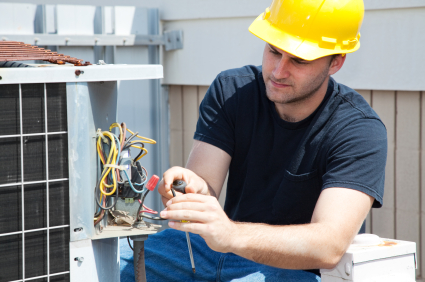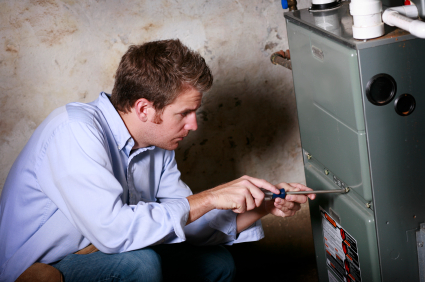Interior temperature and air quality are important elements of a healthy and comfortable home, so repeated problems with an aging or malfunctioning HVAC system should be addressed. If the equipment needs frequent repairs, it may be less expensive in the long run to install a new unit. The life expectancy of an HVAC system varies by type and operating conditions. A heat pump or air conditioner that receives regular maintenance can be expected to last for at least 10 years; a boiler or furnace may reach 15 years of age or more before failing.

Average Cost of HVAC Unit Replacement
The cost of HVAC units varies greatly; pricing depends on a number of factors such as the size and type of system and the energy efficiency rating. In addition to the equipment itself, buyers must also consider the cost of installation and any required modifications to the building like additional ductwork. Replacing an existing system costs less than a new installation if there is already functional ductwork in place. Here are the most common types of HVAC equipment types and their average costs.
- Heat Pump, Electric or Gas Split HVAC System
Split systems consist of both indoor and outdoor components. The outdoor unit is an air conditioner to provide cooling; the indoor unit is a furnace to produce heat. Split systems usually cost between $2,000 and $11,000; the average cost is $6,625. Costs will vary based on the type of units included.
- Central Air Conditioner Unit
A central HVAC unit may cost as little as $1,000 or as much as $4,000 for a large unit; the average cost is $2,600.
- Ductless Split System
This system is an option for homes without existing ductwork. Costs for a ductless system range from $2,000 to $7,000; the average cost is $4,500.
- Gas Furnace
A standalone gas furnace typically costs between $1,000 and $5,000; the average cost is $2,400.
- Gas or Oil Boiler
Regular efficiency boilers range in price from $2,500 to $4,000 with an average cost of $3,250. High-efficiency models cost between $5,000 and $9,000 with an average cost of $7,000.
- Air Handler or AHU
Most air handlers cost between $1,000 and $3,500; the average price is $1,700.
- Commercial HVAC Units
Commercial HVAC systems are much larger, and pricing will depend on the square footage of the building and other factors. Most commercial systems will cost more than $15,000.
Installation Costs
The cost of installation is highly variable and depends on the type of system, the choice of contractor and the complexity of the required work. Installation charges for a typical home range from $3,000 to $6,000 with an average cost of about $4,700. Additional ductwork or repairs can increase the installation fees by several thousand dollars.
In conclusion, the average homeowner can expect to pay between $5,000 and $11,000 for a completely installed HVAC system.
Variables Affecting HVAC Replacement Cost
- Size or Capacity of Unit
HVAC Capacity is measured in BTUs and tons. These refer to a unit’s heating and cooling abilities. The square footage of the home, the local climate and other variables determine what size HVAC unit is required. More powerful units are more expensive, but installing a unit that does not have a high enough capacity can cause early equipment failure and increased energy costs.
- Efficiency Rating
Energy efficiency is another important variable that affects cost. Air conditioners are assigned a seasonal energy efficiency rating (SEER). Alternative measurements for heat pump efficiency include the average fuel utilization efficiency (AFUE) and the heating seasonal performance factor (HSPF). Higher ratings denote more efficient systems, and these generally cost more. However, they save homeowners money in the long run by using less energy.
- Choice of Retailer
Each HVAC equipment retailer will have specific equipment and installation charges. Discounts and special offers may be available; it is advisable to check several different retailers to find the best prices.
- Brand and Quality
Major national brands may be more expensive than lesser-known ones. Before purchasing, buyers should thoroughly research brand names, models and available features to get the best quality system for their money.
- Optional System Features
Programmable thermostats, air purifiers, humidity control features and UV lamps are optional features that will increase cost.
- New or Used Equipment
Used or refurbished equipment may be available at a discounted price.
- Entire vs. Partial Replacement
Some complex systems may only need individual components or units replaced; this decreases the cost of equipment and labor.
- Location and Climate
Colder regions require more powerful systems to maintain desirable temperatures in winter. Units with higher BTU ranges are best for cold climates while systems in the lower BTU ranges are more appropriate for warmer areas.
Replacement Tips
Whether replacing an old HVAC system or purchasing a new one, homeowners should obtain careful measurements of the entire house and record any technical information about existing HVAC equipment. With the required information in hand, professional HVAC retailers and installers can help buyers find the system that best meets their needs at a reasonable price.

Tags: air conditioning, average cost, boiler, central air conditioner, gas furnace, heat pump, heating, HVAC
